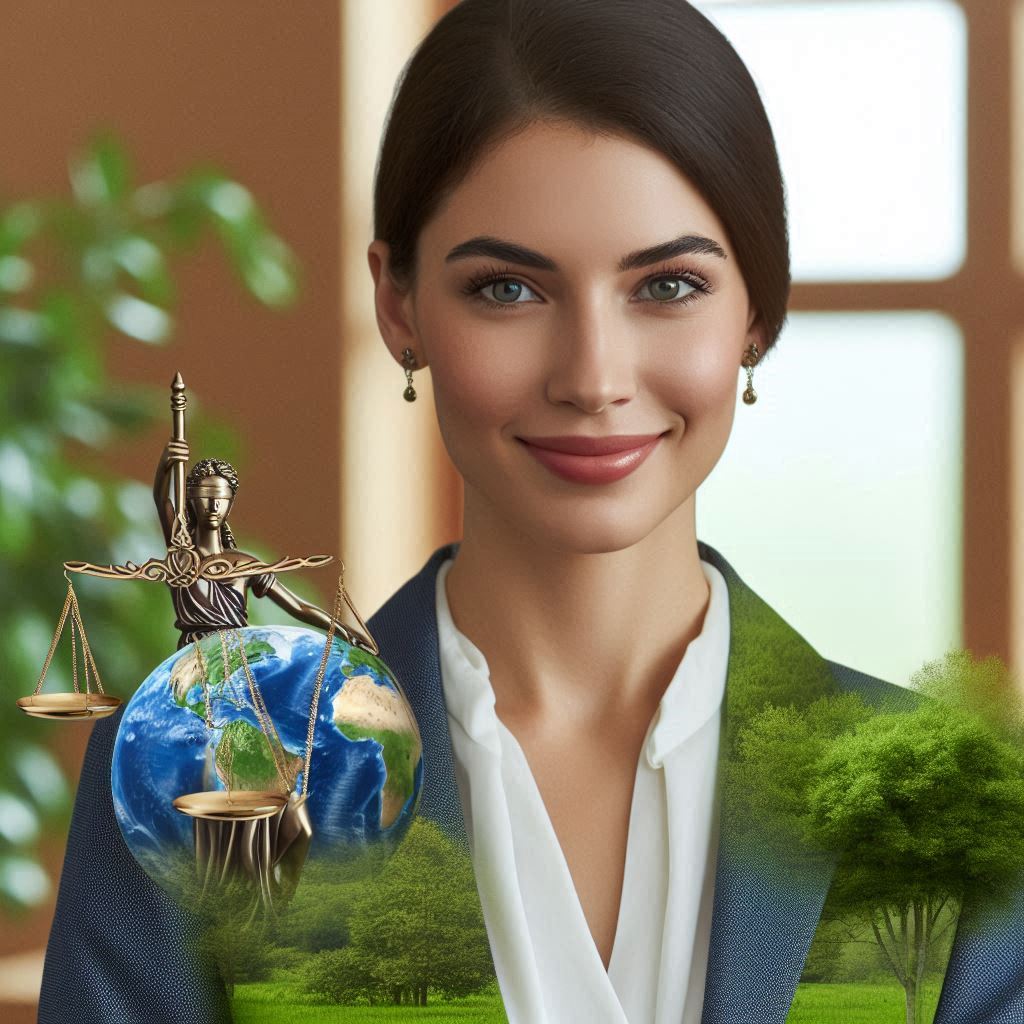Introduction
Environmental lawyers play a crucial role in advocating for environmental protection and sustainable practices.
Environmental lawyers specialize in legal issues related to environmental protection, conservation, and sustainability.
Importance of ethics and responsibilities in environmental law practice
Environmental lawyers have a moral and professional duty to uphold ethical standards and promote environmental justice.
They must adhere to ethical guidelines to ensure fair representation of clients and the environment.
Responsibilities include advocating for environmental policies, representing clients in court, and advising on compliance.
Environmental lawyers must balance the needs of their clients with the protection of the environment.
They play a critical role in shaping environmental policies and enforcing regulations to safeguard natural resources.
The ethical duties of environmental lawyers
Environmental lawyers play a crucial role in preserving the environment while navigating complex legal frameworks.
They must uphold ethical standards to ensure justice and fairness. Their responsibilities extend beyond their clients to include the public and the environment.
Here’s an exploration of their key ethical duties:
Upholding the rule of law and professional conduct
Environmental lawyers must adhere to legal standards and professional conduct. They ensure that all actions comply with the law.
By maintaining these standards, they protect the integrity of the legal system.
They must follow procedural rules and ensure their clients’ compliance with environmental regulations.
They also act as role models by demonstrating ethical behavior and respect for the law.
Maintaining Confidentiality and Avoiding Conflicts of Interest
Confidentiality remains paramount in the lawyer-client relationship. Environmental lawyers must protect client information at all costs.
They must avoid conflicts of interest that could compromise their impartiality.
Lawyers should disclose any potential conflicts to their clients and take appropriate action.
By maintaining confidentiality and avoiding conflicts, they build trust with their clients and the public.
Representing Clients Zealously While Also Considering the Public Interest
Environmental lawyers must balance their clients’ interests with the public good. They must advocate vigorously for their clients within the bounds of the law.
Lawyers should also consider how their actions impact the environment and society. They can achieve this balance by promoting sustainable practices and policies.
Transform Your Career Today
Unlock a personalized career strategy that drives real results. Get tailored advice and a roadmap designed just for you.
Start NowThis approach ensures they fulfill their duty to their clients and society.
Ensuring Honesty and Integrity in All Dealings
Honesty and integrity form the foundation of an environmental lawyer’s reputation. Lawyers must be truthful in all communications and dealings.
They should avoid misleading clients, courts, and the public. Maintaining honesty and integrity fosters trust and confidence in the legal profession.
This ethical duty supports their role in promoting justice and protecting the environment.
Environmental lawyers have a significant impact on shaping environmental policy and law.
By adhering to ethical standards, they ensure a fair and just legal system that benefits everyone.
Read: Difference Between Environmental Lawyers and Advocates
Responsibilities towards clients
Environmental lawyers play a crucial role in balancing legal responsibilities with environmental ethics.
They have specific duties towards their clients to ensure they receive competent legal guidance while promoting environmental sustainability.
These responsibilities include providing competent legal advice and representation, keeping clients informed, advising on potential environmental impacts, and encouraging sustainable practices.
Providing competent legal advice and representation
Environmental lawyers must provide competent legal advice to their clients. This requires a deep understanding of environmental laws, regulations, and policies.
Lawyers analyze complex legal issues, assess risks, and provide strategic guidance to protect clients’ interests.
Competent representation includes advocating for clients in court, negotiating settlements, and ensuring compliance with environmental regulations.
Lawyers must stay updated on legal developments and continuously enhance their expertise.
Keeping clients informed about the progress of their cases
Environmental lawyers must keep clients informed about the progress of their cases. Regular communication is vital to maintain transparency and trust.
Lawyers provide updates on case developments, legal strategies, and potential outcomes.
They explain complex legal concepts in simple terms to ensure clients understand their options.
This open communication fosters collaboration between lawyers and clients, enabling informed decision-making.
Advising clients on the potential environmental impacts of their actions
Environmental lawyers advise clients on the potential environmental impacts of their actions.
They assess how proposed activities may affect ecosystems, communities, and natural resources.
Transform Your Career Today
Unlock a personalized career strategy that drives real results. Get tailored advice and a roadmap designed just for you.
Start NowLawyers identify legal requirements and potential liabilities associated with environmental impacts.
By providing this advice, lawyers help clients make informed decisions that align with environmental regulations and minimize harm.
Encouraging sustainable and environmentally friendly practices
Environmental lawyers encourage clients to adopt sustainable and environmentally friendly practices.
They advocate for reducing carbon footprints, conserving resources, and minimizing pollution.
Lawyers highlight the benefits of sustainable practices, such as cost savings and positive public perception.
By promoting sustainability, lawyers help clients contribute to environmental protection and long-term success.
This aligns legal actions with ethical responsibilities, fostering a more sustainable future.
Read: Impact of Environmental Lawyers on Climate Policy
Responsibilities towards the community and public interest
Advocating for environmental protection and conservation
As environmental lawyers, our responsibilities extend beyond the courtroom to the community and public interest.
Advocating for environmental protection and conservation is not just a job but a moral imperative.
We must use our legal expertise to ensure that our natural resources are safeguarded for future generations.
Participating in pro bono work to support environmental causes
Participating in pro bono work is another vital aspect of our role as environmental lawyers.
By offering our services free of charge to support environmental causes, we can make a tangible difference in our communities.
Whether it’s representing a grassroots organization in a legal dispute or drafting legislation to protect a critical habitat, pro bono work allows us to give back to society and advance the cause of environmental conservation.
Educating the public about environmental laws and regulations
Educating the public about environmental laws and regulations is also essential.
Many individuals may not be aware of their rights or responsibilities when it comes to environmental issues.
As legal experts, it’s our duty to bridge this knowledge gap and empower the public to advocate for their environment.
By hosting workshops, writing articles, and speaking at community events, we can ensure that everyone is informed and engaged in environmental protection efforts.
Holding corporations and individuals accountable for environmental violations
One of the most challenging aspects of our work is holding corporations and individuals accountable for environmental violations.
Whether it’s a company contaminating a water source or an individual dumping hazardous waste, we must be vigilant in enforcing environmental laws and regulations.
Transform Your Career Today
Unlock a personalized career strategy that drives real results. Get tailored advice and a roadmap designed just for you.
Start NowThrough litigation, negotiation, and advocacy, we can seek justice for those affected by environmental harm and prevent future violations from occurring.
In fact, our responsibilities towards the community and public interest as environmental lawyers are multifaceted and crucial.
By advocating for environmental protection, participating in pro bono work, educating the public, and holding violators accountable, we can contribute to a more sustainable and just society.
Let us continue to uphold these responsibilities with integrity, passion, and dedication.
Read: Networking Tips for Aspiring Legal Nurse Consultants

Balancing advocacy and ethical considerations
Environmental lawyers often face challenges in balancing advocacy with ethical considerations.
Navigating these challenges requires careful attention to both legal and moral obligations.
Navigating conflicts between client interests and environmental concerns
Environmental lawyers often encounter conflicts between client interests and environmental concerns.
Clients may prioritize profit over sustainability, creating ethical dilemmas. Lawyers must advocate for their clients while considering environmental impacts.
Balancing these interests requires clear communication and strategic negotiation. Lawyers can guide clients toward sustainable practices that benefit both parties.
Resolving ethical dilemmas in a manner consistent with legal obligations
Environmental lawyers must resolve ethical dilemmas consistent with their legal obligations. They must follow laws while upholding ethical standards.
This balance ensures credibility and trustworthiness in their practice. Lawyers can consult legal frameworks and ethical guidelines to navigate complex situations.
Maintaining transparency with clients about ethical constraints is crucial.
Choosing cases that align with personal values and ethical standards
Environmental lawyers often select cases that align with their personal values and ethical standards. This alignment enhances their commitment to the cause.
Choosing cases that reflect personal beliefs leads to more passionate advocacy.
Lawyers can assess potential cases based on their long-term environmental impacts.
Aligning casework with personal ethics fosters professional satisfaction and integrity.
Seeking guidance from professional organizations and colleagues when facing ethical challenges
Environmental lawyers can seek guidance from professional organizations and colleagues when facing ethical challenges.
Engaging with peers provides diverse perspectives and solutions. Organizations offer resources and support for ethical decision-making.
Lawyers benefit from mentorship and collaboration in addressing complex issues. Seeking guidance helps lawyers uphold their ethical responsibilities effectively.
Transform Your Career Today
Unlock a personalized career strategy that drives real results. Get tailored advice and a roadmap designed just for you.
Start NowBalancing advocacy and ethics is essential for environmental lawyers. They must navigate conflicts, resolve dilemmas, and align their work with personal values.
Seeking guidance ensures informed decision-making and reinforces ethical practice.
This balance allows lawyers to advocate effectively while maintaining their professional integrity.
Read: Legal Nurse Consulting: Essential Education Requirements
Professional development and continuing education
Keeping up-to-date on environmental laws and regulations
Environmental lawyers must prioritize ongoing professional development and education.
Staying updated with current environmental laws and regulations is crucial.
Laws change frequently, and staying informed is essential for providing accurate legal advice.
Regularly reviewing new legislation ensures environmental lawyers remain effective advocates for their clients and the environment.
Participating in ethics training and seminars
Participating in ethics training and seminars strengthens an environmental lawyer’s practice.
These sessions offer valuable insights into ethical dilemmas lawyers might encounter.
By attending these trainings, lawyers reinforce their commitment to ethical standards.
Understanding ethical principles helps environmental lawyers make informed decisions and maintain public trust.
Engaging in mentorship and peer review to improve ethical decision-making
Engaging in mentorship and peer review enhances ethical decision-making. Mentorship provides less experienced lawyers with guidance and support.
Experienced lawyers offer advice on handling complex ethical situations. Peer review allows lawyers to receive constructive feedback on their work.
Collaborating with peers promotes a culture of accountability and ethical growth.
Pursuing additional certifications or specialization in environmental law
Pursuing additional certifications or specialization in environmental law demonstrates a commitment to excellence.
Specializations can include areas like climate change law or natural resource management. Earning certifications enhances a lawyer’s expertise and marketability.
Specialized knowledge equips lawyers to handle complex environmental issues more effectively.
Clients benefit from lawyers who understand specific environmental challenges and regulations.
Continuing education empowers environmental lawyers to better serve their clients and society.
Transform Your Career Today
Unlock a personalized career strategy that drives real results. Get tailored advice and a roadmap designed just for you.
Start NowOngoing learning fosters adaptability in a rapidly changing legal landscape. Environmental lawyers should embrace opportunities for growth and learning.
Maintaining a commitment to professional development ensures long-term success in their careers.
By focusing on these aspects of professional development, environmental lawyers uphold high ethical standards and stay effective in their field.
Through continuous learning and ethical practice, they contribute positively to environmental protection and legal advocacy.
Collaborating with other stakeholders
Environmental lawyers work closely with various stakeholders to address environmental issues effectively.
Collaboration is crucial to achieving meaningful and sustainable environmental outcomes.
By engaging with government agencies, non-profit organizations, scientific experts, and others, environmental lawyers can navigate complex legal landscapes and advocate for environmental protection.
Working with Government Agencies, Non-Profit Organizations, and Scientific Experts
Environmental lawyers engage with government agencies to ensure compliance with environmental laws.
They collaborate with non-profit organizations to support environmental causes and provide legal guidance.
Scientific experts provide valuable insights and data that lawyers use to build strong cases.
This collaboration strengthens legal arguments and supports sustainable solutions.
Building Relationships with Environmental Advocates and Policymakers
Environmental lawyers develop relationships with advocates and policymakers to influence environmental legislation.
They work with advocacy groups to raise awareness and drive change. By building trust and understanding with policymakers, they can shape laws and regulations.
These relationships are essential for creating policies that protect the environment and promote sustainability.
Participating in Interdisciplinary Efforts to Address Complex Environmental Issues
Environmental lawyers participate in interdisciplinary efforts to tackle complex environmental challenges.
They work alongside scientists, engineers, and economists to develop comprehensive solutions.
Interdisciplinary collaboration ensures that all perspectives are considered in environmental decision-making.
By leveraging diverse expertise, environmental lawyers can address issues like climate change and biodiversity loss.
Fostering a Spirit of Cooperation and Mutual Respect Among Diverse Stakeholders
Environmental lawyers foster cooperation and mutual respect among stakeholders by facilitating open communication and understanding.
They mediate disputes and encourage dialogue between conflicting parties.
Transform Your Career Today
Unlock a personalized career strategy that drives real results. Get tailored advice and a roadmap designed just for you.
Start NowBy promoting collaboration, they create an environment where diverse stakeholders can work together.
This approach leads to more effective and lasting environmental solutions.
In a nutshell, collaboration is vital for environmental lawyers to effectively address environmental challenges.
By working with various stakeholders, they can develop comprehensive solutions and advocate for sustainable change.
Conclusion
As we conclude, it is imperative to emphasize the critical role of ethics and responsibilities in environmental law practice.
Environmental lawyers play a vital role in safeguarding our natural resources and ensuring sustainable development for future generations.
We encourage all environmental lawyers to uphold ethical standards and prioritize the public good in their legal practice.
By doing so, they contribute to the protection of the environment and the promotion of sustainable practices.
Therefore, we call on all environmental lawyers to continue their dedication to environmental protection and sustainability.
It is through their unwavering commitment to ethical conduct and responsible legal practice that we can secure a better future for our planet and all its inhabitants.
[E-Books for Sale]
The Big Book of 500 High-Paying Jobs in America: Unlock Your Earning Potential
$19.99 • 500 High-Paying Jobs • 330 pages
Explore 500 high-paying jobs in America and learn how to boost your career, earn more, and achieve success!
See All 500 High-Paying Jobs of this E-Book
1001 Professions Without a Degree: High-Paying American Jobs You Can Start Now
$19.99 • 1001 Professions Without a Degree • 174 pages
Discover 1001 high-paying jobs without a degree! Unlock career tips, skills, and success strategies for just $19.99!




